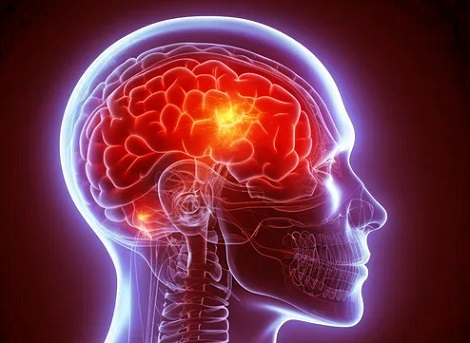Nikhil Prasad Fact checked by:Thailand Medical News Team Jan 02, 2025 3 months, 3 weeks, 3 days, 9 hours, 26 minutes ago
Medical News: A recent landmark study has illuminated a significant relationship between serum folate concentrations and the risk of stroke over a 10-year period. The research, conducted by experts from the Department of Cardiology and the Institute of Cardiovascular Disease at Peking University First Hospital, analyzed a community cohort of over 4,900 participants in China. This
Medical News report will explore the findings and implications of their comprehensive research, providing insights for both medical professionals and the general public.
 Folate Levels and Stroke Risk
Folate Levels and Stroke Risk
Folate, a water-soluble B vitamin, is vital for DNA synthesis, cell division, and various metabolic processes. Low levels of folate have been linked to numerous health conditions, including cardiovascular diseases. This study sought to examine whether folate levels could influence stroke risk and if specific genetic factors might modify this relationship. Researchers also investigated the mediating role of homocysteine, an amino acid linked to vascular damage.
Unveiling the Link Between Folate and Stroke
The study recruited participants from two communities in Beijing and tracked their health over 10 years. All participants were free of cardiovascular disease at the start and provided detailed medical histories, including measurements of their serum folate and homocysteine levels. The data revealed an inverse relationship between folate concentrations and stroke risk. Those with the highest folate levels (above 8.2 ng/mL) were 32% less likely to experience a stroke compared to those with the lowest levels (below 5.0 ng/mL).
The protective effect of folate was particularly pronounced in ischemic stroke, the most common type caused by blood clots obstructing blood flow to the brain. Participants with higher folate levels had a 36% reduced risk of ischemic stroke. Interestingly, folate levels did not significantly affect the risk of hemorrhagic stroke, which occurs due to bleeding in the brain.
Genetic Factors and Folate's Impact
This research highlights the critical role of genetics in the folate-stroke relationship. The study focused on the methylenetetrahydrofolate reductase (MTHFR) C677T gene polymorphism. This genetic variation affects folate metabolism and homocysteine levels, potentially increasing stroke risk. Researchers discovered that folate's protective effects were more robust in individuals with the MTHFR CC genotype, while those with the CT or TT genotypes exhibited less benefit.
These findings suggest that genetic screening could help identify individuals who would benefit most from folate supplementation. This personalized approach to stroke prevention could be a game-changer, particularly in regions where genetic variations in folate metabolism are prevalent.
Homocysteine as a Mediating Factor
The study also confirmed that homocysteine levels play a mediating role in the folate-stroke relationship. Elevated homocysteine levels have long been associated with vascular damage, increased blood clot formation, and infl
ammation. The researchers found that 14.5% of folate’s protective effect against stroke could be attributed to its ability to lower homocysteine levels. This underscores the importance of monitoring homocysteine as a biomarker for stroke risk.
Broader Implications of the Study
The findings of this study have significant public health implications. Folate deficiency is common in populations with low dietary intake of folate-rich foods, such as leafy greens, beans, and fortified grains. In regions where dietary folate is insufficient, fortification programs and folate supplementation could play a critical role in reducing stroke incidence.
This research also adds to the growing body of evidence supporting the role of B vitamins in cardiovascular health. Folic acid, the synthetic form of folate, is already recommended for pregnant women to prevent neural tube defects in newborns. This article highlights the potential for folic acid supplementation to provide additional benefits for stroke prevention, particularly in high-risk populations.
Concluding Thoughts on the Findings
The study concluded that maintaining adequate folate levels could significantly reduce the risk of stroke, especially ischemic stroke, over a decade. The protective effect was mediated by lower homocysteine levels and influenced by genetic factors like the MTHFR C677T polymorphism. These findings underscore the importance of individualized approaches to nutrition and healthcare.
Furthermore, the results suggest that folate status should be a key consideration in public health strategies aimed at reducing stroke prevalence. While the study focused on a Chinese population, the insights gained are relevant globally, as folate deficiency and stroke are universal health concerns.
The study findings were published in the peer-reviewed journal: Nutrients.
https://www.mdpi.com/2072-6643/17/1/159
For the latest on Stroke Research, keep on logging to Thailand
Medical News.
Read Also:
https://www.thailandmedical.news/news/how-salidroside-helps-protect-the-brain-after-stroke
https://www.thailandmedical.news/news/amino-acids-in-brain-fluid-linked-to-higher-stroke-risk-and-recovery-outcomes
https://www.thailandmedical.news/news/genetic-clues-reveal-how-covid-19-may-trigger-ischemic-stroke-risk
https://www.thailandmedical.news/news/study-on-dietary-habits-and-stroke-unveils-surprising-links
https://www.thailandmedical.news/news/spike-protein-from-sars-cov-2-worsens-stroke-risks
https://www.thailandmedical.news/news/herbs-and-phytochemicals-study-unveils-the-potential-of-total-saponins-from-trillium-tschonoskii-maxim-in-restoring-cognitive-function-after-stroke
https://www.thailandmedical.news/news/covid-19-news-breaking-millions-are-suffering-from-silent-strokes-as-a-result-of-sars-cov-2-and-are-not-even-aware-of-it
https://www.thailandmedical.news/news/covid-19-news-numerous-studies-and-emerging-data-are-warning-that-strokes-and-heart-failures-are-a-serious-threat-for-post-covid-individuals
https://www.thailandmedical.news/news/breaking-university-of-utah-study-alarmingly-shows-that-sars-cov-2-is-increasing-the-risk-of-strokes-in-children-even-in-the-asymptomatic
https://www.thailandmedical.news/news/warning-u-s-cdc-study-shows-that-stroke-risk-among-older-adults-is-ten-times-greater-in-initial-3-days-after-a-covid-19-diagnosis
https://www.thailandmedical.news/news/breaking-swedish-study-shows-that-covid-19-is-now-a-key-driver-for-heart-attacks-and-strokes
https://www.thailandmedical.news/news/news-covid-19-university-of-california-study-explains-why-covid-19-increases-risk-of-strokes
https://www.thailandmedical.news/news/sleeping-longer-than-9-hours-or-long-naps-during-the-day-increases-risk-of-strokes
https://www.thailandmedical.news/news/treating-afib-with-ablation-reduces-mortality-and-stroke
